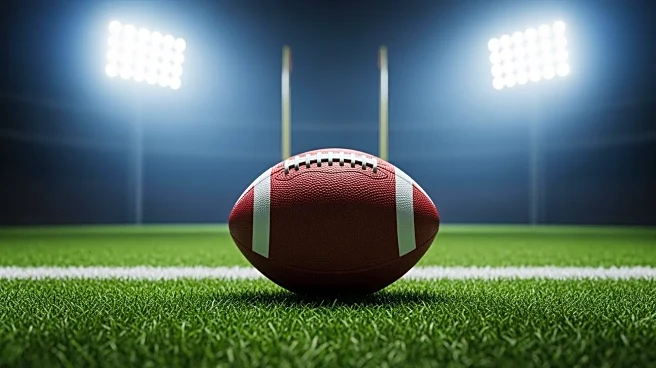What's Happening?
Marshawn Kneeland, a defensive end for the Dallas Cowboys, scored his first NFL touchdown during a 'Monday Night Football' game on November 3. The touchdown was a result of a blocked punt, marking a significant
milestone in Kneeland's career. However, tragedy struck shortly after, as Kneeland died two days later following a police chase, crash, and self-inflicted gunshot wound, according to Texas authorities. Kneeland, who was 24 years old, had worked tirelessly to reach the NFL, overcoming numerous challenges throughout his life.
Why It's Important?
The sudden and tragic death of Marshawn Kneeland highlights the pressures and challenges faced by professional athletes, both on and off the field. Kneeland's story is a poignant reminder of the personal struggles that can accompany public success. His death may prompt discussions about mental health support for athletes, emphasizing the need for comprehensive resources to help them navigate the demands of their careers. The incident also impacts the Dallas Cowboys, as they cope with the loss of a teammate and the emotional ramifications within the team.
What's Next?
In the wake of Kneeland's death, the Dallas Cowboys are preparing to continue their season, likely dedicating upcoming games to his memory. The team may engage in discussions about mental health awareness and support systems for players. Additionally, the NFL and other sports organizations might review their policies and resources related to athlete well-being, potentially leading to enhanced support structures. Fans and the sports community may rally to honor Kneeland's legacy, celebrating his achievements and advocating for mental health initiatives.
Beyond the Headlines
Kneeland's story sheds light on the broader societal issues surrounding mental health, particularly in high-pressure environments like professional sports. It raises ethical questions about the responsibilities of sports organizations to their players, including the provision of mental health resources and support. The incident may also influence cultural perceptions of athletes, encouraging a more empathetic understanding of their personal challenges and the importance of mental health advocacy.









